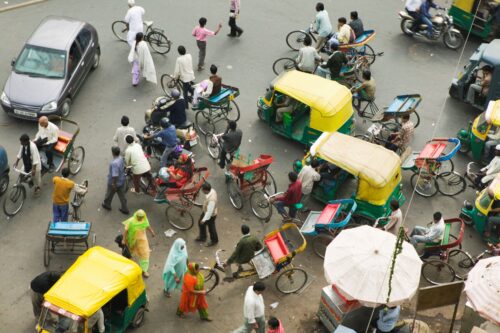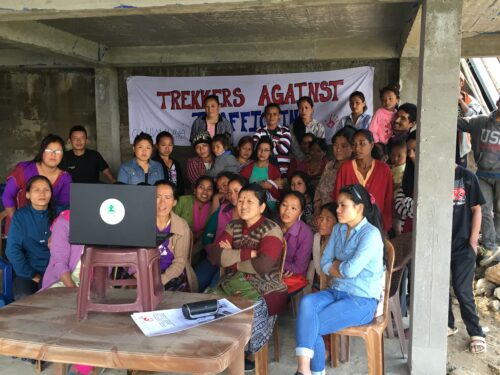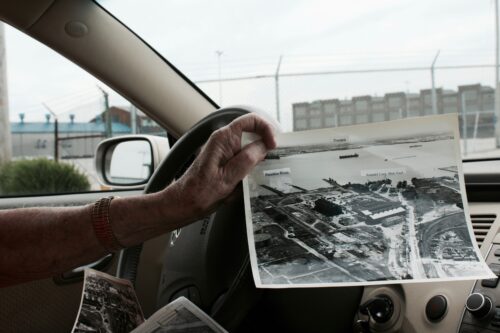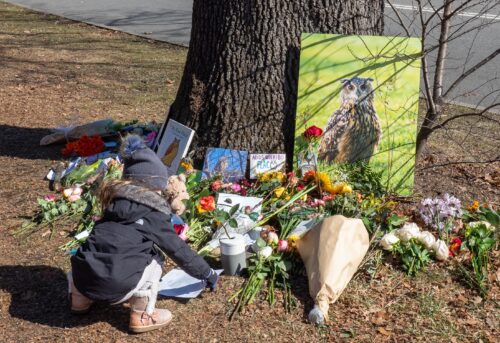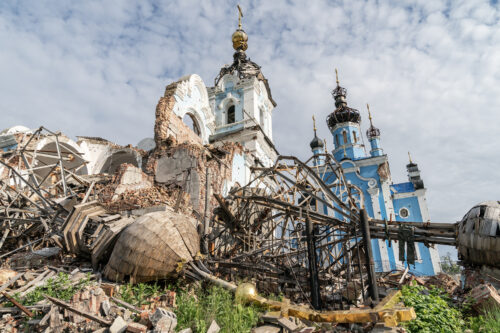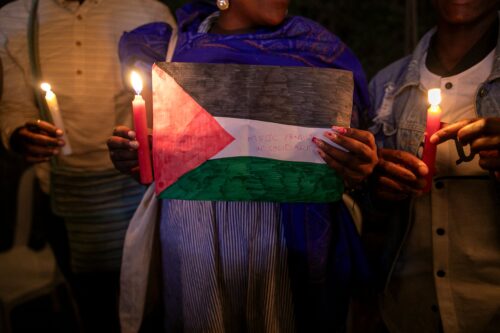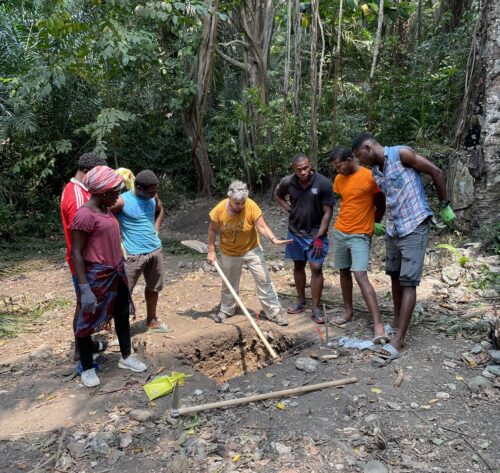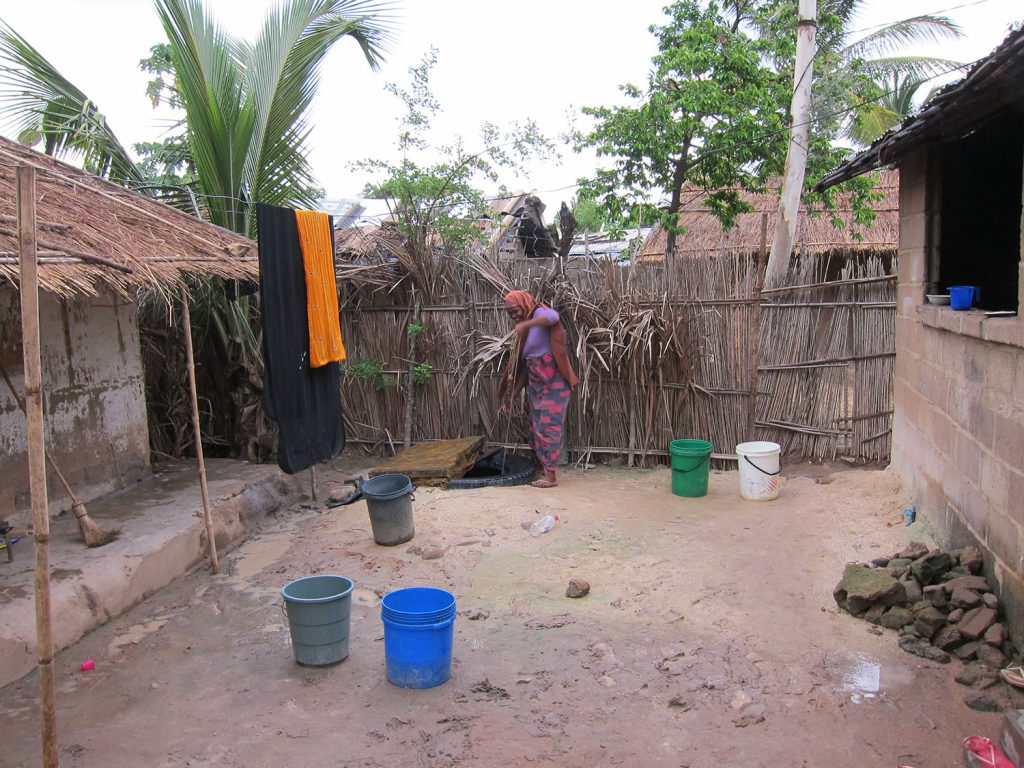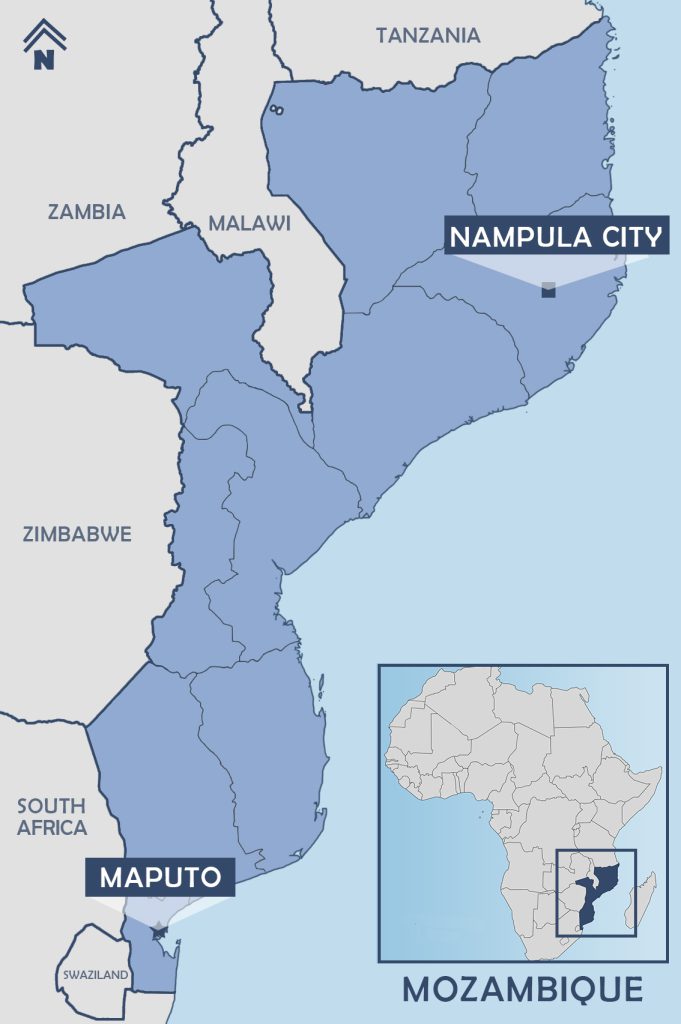How Austerity Unravels Social Ties
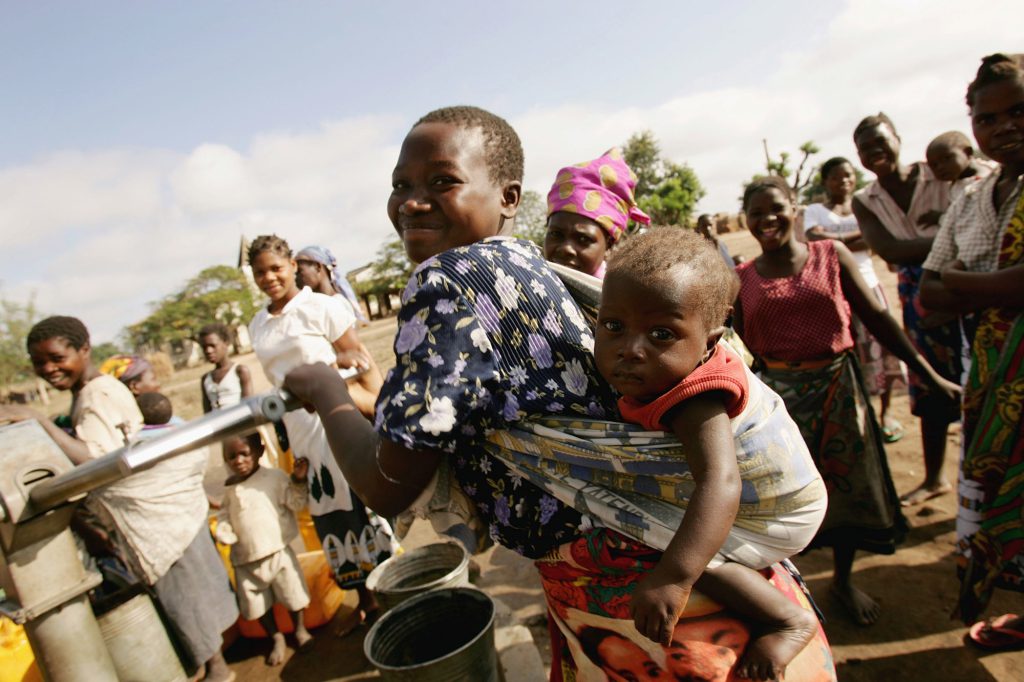
Roxana and Rajah are neighbors who live on the outskirts of Nampula City in northern Mozambique. [1] [1] The names of research participants have been changed in this article in order to protect their anonymity. Theirs is a densely populated low-income neighborhood where mutual exchange and assistance are part and parcel of everyday life. Yet those interactions—like those of many other poor Mozambicans—are shaped and strained by the country’s economic policies, particularly austerity measures imposed by its debt-ridden government in the late 1980s and early 1990s.
I began fieldwork in Mozambique in 2010 and witnessed how the costs of austerity continued to play out two decades later in the lives on Roxana, Rajah, and many others like them, often stretching critical mutual support networks and trust relationships to their breaking point.
Every morning at dawn, Roxana makes the same rounds, gathering her plastic bag and bucket and calling on her neighbors. One-by-one she asks for water, edible plant leaves, a bit of salt, charcoal, and flour. On the face of it, there is nothing exceptional about her requests, since households in the area often establish and affirm their social bonds through such gestures of goodwill. Roxana, however, is testing her neighbors’ patience. She is an unemployed, single parent of seven and the primary caregiver for her disabled elderly mother. She depends on these contributions to survive, and that dependence has become a source of constant friction and irritation in her community. Some neighbors have accused Roxana of stealing; one even erected a bamboo fence between their yards to keep her out.
Rajah, on the other hand, is comparatively fortunate. By selling pastries and maheyo (a nonalcoholic drink produced from maize flour and germinated malt), she has been able to supplement her husband’s irregular income as a truck driver. It is enough to scrape by during difficult times. As she and her family are relatively self-sufficient, Rajah enjoys better relationships with her neighbors than does Roxana. Yet Rajah, too, feels the sting of resentment: Her impoverished relatives in the countryside accuse her of neglecting them. Rajah has been estranged from her rural kin for years as a result.
Things were not always so for the two women. When Rajah was still young, her mother passed away, so she spent the better part of her youth living in the care of relatives in the country. Roxana, for her part, has fond childhood memories of friends coming over to her place and long afternoons spent together. It had been a time of optimism; her father held a secure job as an assistant at a hospital, and the neighborhood had plentiful electricity and water, sewers, and roads lined with street lights. Today, though, Roxana rarely invites anyone in. The house’s roof and walls are crumbling, it has no running water, and with no electricity it is dark inside. She mainly uses her home as storage space for her few possessions: a table, chair, mattress, cooking utensils, and clothes. At night, when violent gangs of petty criminals roam the neighborhood’s alleyways and thoroughfares, it serves as shelter and protects her and her family from assault.
Roxana’s and Rajah’s predicament is intimately tied to Mozambique’s dramatic recent history. The country fought a brutal civil war from 1976 to 1992, which brought its economy to the brink of collapse. To secure loans from the International Monetary Fund (IMF) and other international creditors, the country imposed a series of strict spending cuts and privatization policies that slashed government jobs and social services.
Both women came of age in the early ’90s, just as these austerity measures were taking effect. While Roxana’s family had managed to escape civil war relatively unscathed, they have been badly affected by austerity in the decades since. First, her father was laid off and sent into early retirement as a result of budget cuts at the hospital. Roxana and her siblings were unable to find work; she relied on contributions from the fathers of her children and her suitors, working occasional odd jobs. Ultimately, she was left with little choice but to turn to neighbors for assistance—even as she became socially ostracized in the process.
Rajah and her household have been better able to use the changes besetting Mozambique’s economy to their advantage. Her husband works for a private contractor, and privatization and outsourcing have brought new income-earning opportunities. Yet the couple is hardly financially secure, and destitution remains just a mishap away. It has put Rajah in an impossible position; although she feels she owes a debt of gratitude to her rural kin for their help in raising her, she can’t afford their incessant demands for support.
Over the course of my fieldwork in Nampula City, conducted between 2010 and 2012 and in 2015, I met many others like Roxana and Rajah. They were equally stuck in conditions of vulnerability and precarity. I found that the plight of those who were worst affected frequently evoked tremendous displays of compassion and solidarity from others around them, who, despite being only minimally better-off themselves, often went to considerable lengths to help. Yet these conditions also laid the groundwork for fear and mistrust, even within families. People scrutinized each other’s every purchase. An array of walls and fortified doors popped up between houses to safeguard personal belongings.
Such hardship raises questions about the cost of austerity. I started fieldwork in Mozambique in the aftermath of the 2007–08 worldwide financial crisis. A number of countries faced debt distress, and many experimented with austerity programs. The rationales for these programs were similar to the ones guiding Mozambique’s quest for austerity two decades earlier. Back then, Mozambicans were promised that if they diligently bore the consequences of austerity, they would be rewarded in the future with sustainable economic growth and a chance to escape poverty for good. It was the painful but necessary way forward, the country’s lenders argued. Investments would return, growth would resume, and wealth would trickle down throughout the population as time went on.
As I became immersed in the lives of the Mozambicans who participated in my research, I wondered whether the exclusive focus of governments on jumpstarting the economy was justified. Austerity policies around the world have been criticized for many reasons. The poor and vulnerable are often hit the hardest, and experts disagree on whether austerity is even effective at rescuing struggling citizens. Mozambique certainly presents a cautionary tale in this regard: Although economic growth did pick up and stabilized in the ’90s, that recovery has done little to improve living conditions for the poor, and the country continues to lag behind others in the region in basic human development indicators such as life expectancy and education.
Yet, as I recently detailed in a study published in the journal Africa, the sense of disillusion and loss I encountered in the field went beyond experiences of economic suffering or the unfulfilled promises of development. Time and again, when people spoke of the past and contrasted it wistfully with the present, they also raised a separate if related grievance—the damage wrought on the social fabric of their communities, and how difficult it has become to comport themselves morally and in mutuality with others. Even during the harsh civil war, when famine was a constant threat and urban centers like Nampula City struggled to accommodate rural Mozambicans fleeing violence, the people I interviewed claimed there was more support and understanding among residents, and a greater willingness to look out for one another.
Social inequality is responsible for some of this fraying. The benefits and costs of economic growth have not been evenly distributed in Mozambique. As a result, the gap between the haves and have-nots has widened. As the experiences of Roxana and Rajah illustrate, it has become increasingly challenging for people to negotiate help from family, neighbors, and friends. The neoliberal ideology underpinning austerity programs is also partly to blame. This attitude celebrates individualism and encourages the singular pursuit of self-interest and economic success.
I contend, however, that a key reason why austerity has so negatively impacted social relationships in Mozambique is precisely because the country so narrowly defined its success in economic terms. When the government adopted spending cuts and sold off or closed state-owned enterprises in the late ’80s and early ’90s to demonstrate financial prudence and worthiness to creditors, those costs didn’t disappear just because they were deleted from the state budget. The financial responsibilities of social welfare, job creation, and health care were absorbed by society. Mozambicans have tried to make up for these cuts as best they can, but Roxana, Rajah, and many like them have paid a high price.
Mozambique is now in the midst of another economic crisis. Prolonged low interest rates in Western countries after the 2007–08 crisis led investors to look elsewhere, including Mozambique, for higher returns. Natural gas reserves were discovered off the country’s northern coast in 2010, and a group of Mozambican politicians and officials, with the help of Swiss and Russian banks, have taken out US$2 billion in state-guaranteed loans in anticipation of exploiting those reserves, without obtaining the requisite parliamentary approval. These shady financial dealings have led the IMF and donor countries to suspend financial cooperation with the Mozambican government until it can demonstrate transparency and accountability. Additionally, the IMF has called for increased austerity to cope with the fallout of the crisis and to bring down public debt to sustainable levels.
Thus far, Mozambican President Filipe Nyusi has resisted these calls, seeking to minimize the impact on social spending. But he is walking a political tightrope: Without the support of the IMF and the donor community, the country’s public finances rely on the commercial loan market, where interest rates are exceedingly high. His ruling party is banking on the country’s economy to weather the storm until money from gas royalties arrives in 2021—or, failing that, until after the next election in 2019. There is an element of opportunism involved, not least of all because not giving in to the IMF lets the culprits behind the unscrupulous loans off the hook. Though to be fair, the country’s past experiences with austerity measures suggest that Nyusi is right to look for alternatives.
Mozambique is not alone in its austerity struggles, and other countries, like Greece and the United Kingdom, where austerity continues to steer economic policy have a lot to learn from these cautionary tales. First, governments should reserve efforts to balance state budgets for times of prosperity, when resilience is greater and people are better equipped to deal with the consequences of reduced government spending. If deficits must be corrected during a recession, there are methods other than spending cuts. Progressive taxes, for example—which tax the wealthy at higher rates than the poor—distribute the weight in a fairer and more inclusive manner, and place less of a burden on interpersonal relations and self-initiative.
Secondly, governments should value and nurture the ties that bind citizens. After investment bank Lehman Brothers collapsed in 2008 and other banks threatened to close in its wake, governments quickly stepped in to prop up their balance sheets, arguing that trust in the financial system was too important to let the banks fail.
Surely, the social networks of citizens are just as, if not more, important for the well-being of society. These networks should also be protected. Without care and support, fear and mistrust seep into communities, and neighbors may one day find themselves staring suspiciously at one another across a newly erected fence, wondering how they got there.











